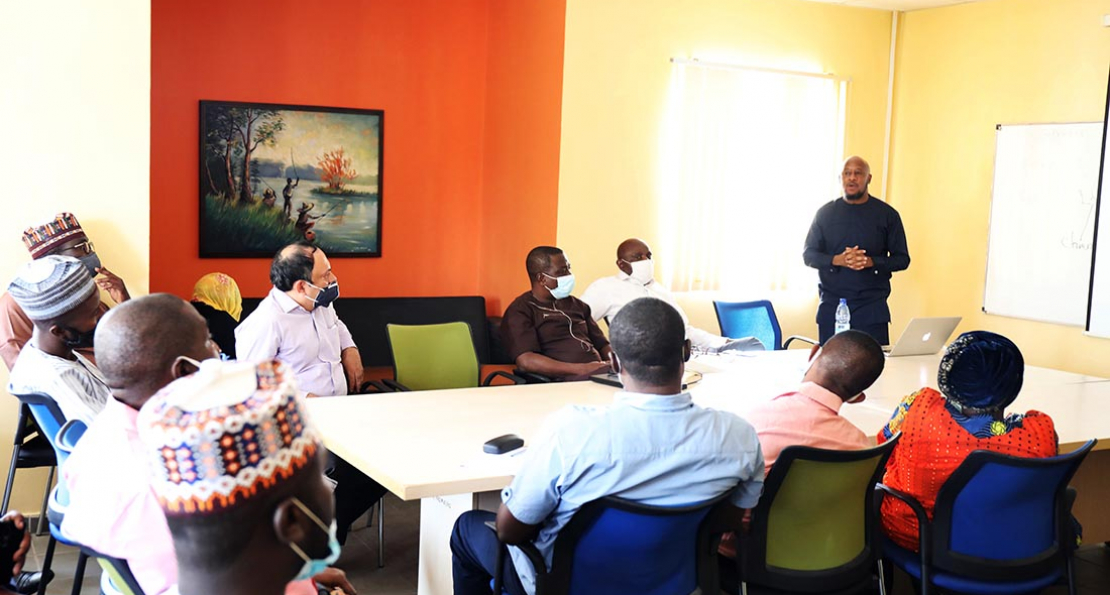“The world is standing still for AUN’s flagship today. This is our watershed moment.” Inspiring words from Dean Olumide Longe set the tone for the first-ever Ph.D. symposium in AUN’s History.
The School of Information Technology and Computing hosted Faculty, staff, Ph.D. students, and guests at the Arts & Sciences building. They all trooped into the Faculty Lounge to witness a groundbreaking presentation on the acceptance of e-learning systems in Northern Nigeria. As the room filled to social distancing capacity, some stood outside hoping for a glimpse of the proceedings.
Ph.D. candidate and Information Systems Major, Nasiru Yakubu presented his research findings. In particular, he investigated the disparity in the acceptance and use of technology by public and private universities in northern Nigeria. The qualitative study made use of a conceptual framework of 12 theories including the Technology Acceptance Model, the Delone & Mclean IS Model, and the UTAUT model. His findings revealed that out of about 90 universities in northern Nigeria, only 4 universities make use of Learning Management Systems: the National Open University of Nigeria, the University of Jos, Baze University, and the American University of Nigeria.
Mr. Yakubu made use of online and paper-based surveys to investigate 54 hypotheses. 20 on the moderating effect of demographics and the rest on the difference between how public and private universities adopt Learning Management Systems. He found that respondent economic backgrounds and exposure to technology greatly influenced their acceptance of technology-enhanced learning.
“This is something I am really passionate about. Students have to leverage technology to achieve success in today’s world. Learning Management Systems can make large classes smaller. If you go to developed countries, you would find out almost every institution has a learning management system. Research shows that Nigerian students are behind when compared to their global counterparts.” Mr Yakubu said.
According to his literature review, this is the first study in Nigeria which examines the moderating effect of technology-enhanced learning. He believes his research will serve as a blueprint for other institutions to adopt Learning Management Systems.
At question time, Associate Professor, International and Comparative Politics, Dr. Lucky Imade, was quick to his feet. He praised the cutting edge research and asked what the implications were and the impact of COVID-19 for this study. In response, Mr. Yakubu said the coronavirus pandemic strengthens the case for Learning Management Systems adoption in Nigeria.
“Universities were shut down for eight months because they had not adopted enhanced technology learning. This is one of the challenges of education in developing countries. We must do more work to adopt technology specifically suited for our own purpose, not just borrowing from other countries.”
Mr. Yakubu’s supervisor Professor Mohammadou Kah joined in from Senegal while his co-supervisor Dr. Dasuki joined from Sheffield University in the UK via Google Meet. The audience was quite representative, with participants from outside the AUN community also in attendance. Dr. Sandra and Dr. Garba from the Modibbo Adama Univerity of Technology also attended the symposium.
“This presentation sets the tone. As a pioneer Ph.D., the main challenge lies ahead. We are proud of his research as it contributes to the body of knowledge. All inputs are important because nobody has a monopoly of knowledge.”
The Provost, Professor Attahir Yusuf, Dean Chris Mbah, Dean Abel Ajibesin, Chair Software Engineering Sandip Rakshit, Assistant Professor, Computer Science & Software Engineering, George Thandekkattu, Director, Academic Planning and Quality Assurance, Professor Samuel Tesunmbi, and many more faculty attended the symposium. In closing, Ph.D. candidate Nasiru Yakubu thanked all guests for their valid inputs, promising to improve his research as advised.
Proud of his candidate’s performance, Dean Olumide Longe quipped,
“Nas is leading us into the future”
By Office of Communications


